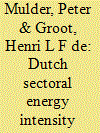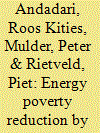|
|
|
Sort Order |
|
|
|
Items / Page
|
|
|
|
|
|
|
| Srl | Item |
| 1 |
ID:
117262


|
|
|
|
|
| Publication |
2013.
|
| Summary/Abstract |
This paper makes use of a new dataset to investigate energy intensity developments in the Netherlands over the period 1987-2005. The dataset allows for a comparison with 18 other OECD countries. A key feature of our analysis is that we combine a cross-country perspective with a high level of sectoral detail, covering 49 sectors. Particularly innovative is our evaluation of energy intensity developments in a wide range of Service sectors. We find that across sectors, energy intensity levels in the Netherlands on average decreased only marginally, and increased in Services. This performance is in general worse than the OECD average, especially between 1987 and 1995. Changes in the sectoral composition of the economy play an important role in explaining aggregate trends. In the Manufacturing sector, about half of the efficiency improvements were undone by a shift towards a more energy-intensive industry structure. In contrast, in the Service sector efficiency decreased, which was undone for about one third by a shift towards a less energy-intensive sector structure.
|
|
|
|
|
|
|
|
|
|
|
|
|
|
|
|
| 2 |
ID:
128000


|
|
|
|
|
| Publication |
2014.
|
| Summary/Abstract |
In low- and middle-income countries, Liquefied Petroleum Gas (LPG) can be an attractive alternative to the widespread use of traditional kerosene. Not only is LPG a relatively clean, safe and cost-effective fuel for households, its large-scale adoption also reduces the heavy burden of kerosene consumption subsidies on government budgets. Against this background, we evaluate the impact of a large government program to substitute LPG for kerosene in Indonesia. Using a household survey across urban, suburban and rural regions we find that this program was very effective in causing a large scale shift from kerosene to LPG. This shift was positively influenced by level of education, household size and household income. Contradicting the energy-ladder model, the LPG program, reinforced by an increase in the price of kerosene, led to increased stacking of fuels, including increasing consumption of both electricity and traditional biomass. In addition, our analysis shows that the LPG program failed to substantially reduce the overall number of energy-poor people, but it has been effective in alleviating extreme energy-poverty. Finally, we find that medium and higher income households in suburban areas benefitted most from the LPG program.
|
|
|
|
|
|
|
|
|
|
|
|
|
|
|
|
|
|
|
|
|